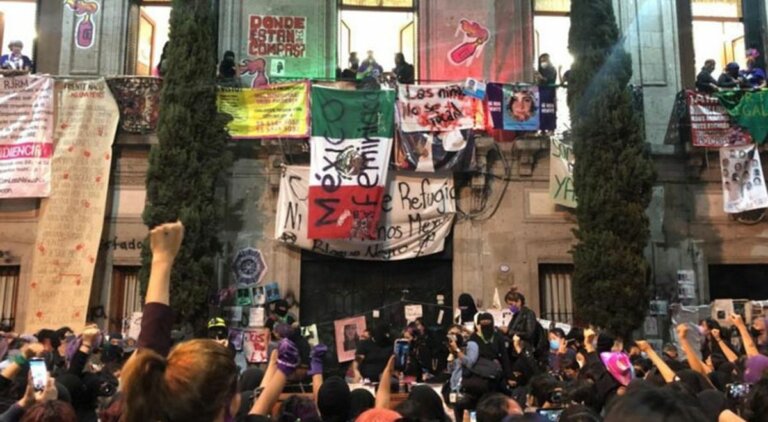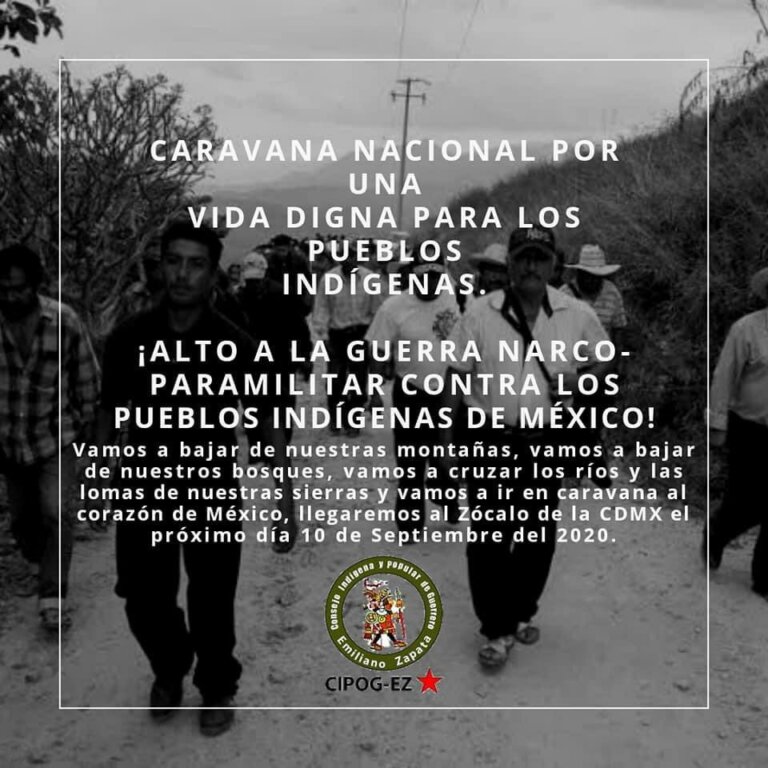Democracy Now, October 4, 2006 – In Oaxaca, Mexico, tensions remain high over concerns that the government is planning to use force to crush a populist uprising there. Over the weekend, military aircraft began flying over Oaxaca City and additional troops were deployed to nearby army posts. A headline in the Mexico City daily Milenio proclaimed, “Preparations for war in Oaxaca.”
Over the past few months, tens of thousands of striking public school teachers have been joined by indigenous, youth and labor organizations to launch a widespread campaign of civil disobedience in Oaxaca. The protesters are calling for Oaxaca governor Ruiz Oritiz to resign. Protesters have blockaded streets and government buildings and have taken over the state-run television station.
President Vicente Fox has said he will resolve the standoff before he leaves office at the end of November and has not ruled out the use of force.
We go to Oaxaca to get a report from independent journalist John Gibler.
Download the mp3 (6:27 minutes)
Watch the video on Democracy Now!
- Vicente Fox, President of Mexico: “While the possibility exists to reach an agreement we will continue to insist on it, in reaching an agreement and resolving everything in that manner. If this does not happen, violations of the law must always be stopped, and must be punished. This government is ready to fulfill its responsibility on both accounts. First, to promote a dialogue, to look for a democratic understanding, and, to always uphold the application of the law.”
Meanwhile, leaders of the Oaxaca populist uprising said they would not attend a round of negotiations set for today in Mexico City. They accused the government of using the proposed forum as an attempt to legitimize the use of force.
- Flavio Sosa, a leader of the People’s Popular Assembly of Oaxaca: “This is like double talk, like a forum that is attempting to be an ultimatum. We are not going to accept it. This town has a peaceful vocation. We are right and most of society is with us. This is a peaceful fight, I want to insist.”
For more on the latest, we go to Oaxaca to speak with independent journalist John Gibler.
- John Gibler, independent journalist based in Mexico. His articles have been published in a many magazines including Z magazine and Left Turn. John’s article about the recent events in Oaxaca will be in the November issue of In These Times. John is also a Human Rights Fellow with Global Exchange.
JUAN GONZALEZ: President Vicente Fox has said he will resolve the standoff before he leaves office at the end of November and has not ruled out the use of force.
PRESIDENT VICENTE FOX: While the possibility exists to reach an agreement, we will continue to insist on it, in reaching an agreement and resolving everything in that manner. If this does not happen, violations of the law must always be stopped and must be punished. The government is ready to fulfill its responsibility on both accounts, first to promote a dialogue to look for democratic understanding, and second, to always uphold the application of the law.
JUAN GONZALEZ: That was Mexican President Vicente Fox. Meanwhile, leaders of the Oaxaca populist uprising said they would not attend the round of negotiations set for today in Mexico City. They accused the government of using the proposed forum as an attempt to legitimize the use of force. This is Flavio Sosa, a leader of the People’s Popular Assembly of Oaxaca.
[inaudible]
AMY GOODMAN: John Gibler is an independent journalist based in Mexico. We’ll play that clip in just a minute, but John joins us now from Oaxaca. Welcome to Democracy Now! Hi, John.
JOHN GIBLER: Hi there.
AMY GOODMAN: Can you describe what’s happening right now?
JOHN GIBLER: For the past nine days, the situation in Oaxaca has been incredibly tense, as the rumors of an imminent federal police or military operation to uproot the protests here have coursed through the city, multiplying the number of people that are taking to the streets at night, especially to guard the night barricades that are set up between 10:00 and 11:00 at night on street corners throughout the city, an incredible number, over 1,000 by the most conservative estimates, of barricades set up through the city. During the daytime, they lift up the barricades, and usually the city returns to more or less a normal pace of life, but again, the tension is palpable in the air.
JUAN GONZALEZ: John, there were recently some bombings of some banks in the city by a previously unknown group. Could you talk about that and what’s been the reaction of the People’s Assembly that is leading the civil disobedience there?
JOHN GIBLER: The People’s Assembly immediately denounced those bombings. They were very low-intensity homemade bombs, pipe bombs, that were set off early in the morning two days ago outside of a couple of banks. And the People’s Assembly immediately called a press conference denouncing the bombings and saying that they imagined that they were a counterinsurgency tactic used by the government to try and create an impression, once again, that their movement is some kind of an urban guerilla movement. So they’ve publicly denounced the bombings, called once again for only organized civil disobedience response to violence that has taken place over the last few months.
AMY GOODMAN: Are we seeing a new Chiapas, John?
JOHN GIBLER: We’re seeing something like that. This is definitely — the key word there is “new.” I have never seen anything like this movement, because Chiapas, again, it was an armed uprising. These were people who had dealt with — you know, the indigenous people of Chiapas — decades, if not centuries, of incredible state neglect and repression. And that also, I think, is at the root of the uprising here. But there is no one walking around in ski masks carrying AK-47s here. I mean, these are teachers in their 40s and 50s, wrapped in blankets, sitting around fires at barricades at night, with no guns in sight. They’ve got sticks and rocks, and especially the younger, the high school and college-aged students have a lot of Molotov cocktails that they wheel around in shopping carts. But this is not a guerilla movement, which makes it something very distinct, something very new. But that decades, if not centuries, of discontent is at the root here, I think, is undeniable.
JUAN GONZALEZ: Well, from all of the reports that I have heard and the people we’ve interviewed, it seems to me more reminiscent of the Gwangju uprising in South Korea, the democracy uprising decades ago, or in Cordoba, Argentina, there was one also in the ’70s. What’s been the impact on the general population throughout Mexico, now that all of the furor over the elections has died down to some extent? Is the rest of the nation following what’s going on here? And how is public opinion, in terms of the ongoing uprising?
JOHN GIBLER: Absolutely. This is definitely the top story. It’s on the front page of all the national newspapers and the top of the news hours here in Mexico. So the eyes of the country are without a doubt on Oaxaca, since the movement has been going on for so long, four months now. And it also comes on the heels of a spectacular civic civil disobedience uprising in response to allegations of electoral fraud.
AMY GOODMAN: John Gibler, we’re going to have to leave it there. I want to thank you for being with us. John Gibler, speaking to us from Oaxaca. We’ll certainly continue to follow details.
—
source: http://www.democracynow.org/



